Hospitality technology trends refer to the innovative solutions and digital tools adopted by hotels and other accommodation providers to enhance their operations and improve guest experiences. In the digital age, such technologies have notably helped numerous hotels elevate guest satisfaction, streamline operations, and maintain competitiveness in a fast-paced market.
In this blog, we'll explore the top hospitality and tourism technology trends for 2025, helping you decide which to integrate into your hotel business.
Why keeping up with the latest technology trends is essential in the hospitality industry?
Numerous businesses in the hospitality industry are now deploying various management solutions. From contactless payments to smart room technology, everyone is almost going digital.
Here are some of the benefits enjoyed by businesses that have deployed tech systems to their businesses:
a. Staying competitive
According to the Hospitality Global Market Report 2023 the global hospitality industry market grew from $4,390.59 billion in 2022 to $4,699.57 billion in 2023 at a compound annual growth rate (CAGR) of 7.0%. This significant growth is partly due to the rebound from global travel restrictions. In such a competitive market, adopting the latest technology can significantly differentiate a hotel.
Implementing advanced tech solutions attracts tech-savvy guests who seek modern amenities and personalized experiences. These technologies enable hotels to offer unique services that stand out from their competitors, driving higher occupancy rates and guest loyalty.
b. Enhancing guest satisfaction
As of 2022, 85.9% of hoteliers reported offering in-room technology, while 74% of hotels plan to implement digital apps for customer engagement. Technology plays a pivotal role in enhancing guest experiences and satisfaction in the hospitality industry.
Personalized services, facilitated by data analytics, enable hotels to cater to individual guest preferences, creating memorable stays. Innovations like hotel apps, mobile check-ins, smart room controls, and AI-driven customer service streamline guest interactions, making their stays more convenient and enjoyable.
Learn how to improve guest experiences in our blog 9 Proven Strategies to Boost Hotel Guest Satisfaction: A Comprehensive Guide.
{{blog-cta-video="/features/product-updates"}}
c. Operational efficiency
According to a HotelTechReport survey, 81% of hoteliers believe technology will be increasingly crucial for the success of hotel businesses. Integrating new technology into hotel operations can substantially improve efficiency and cost reduction.
Automating routine tasks, such as reservations, check-ins, and housekeeping, frees up staff to focus on high-touch services. Additionally, energy-efficient technologies and IoT solutions help reduce operational costs by optimizing resource usage.
To learn more about the importance of automation to hoteliers, read our article Navigating the Staff Shortage Challenge in the Hospitality Industry.
What are the 2025 hospitality technology trends?
Planning on future-proofing your hotel business? Here are the top technology trends for the hospitality industry:
a. Personalization through data
Leveraging guest data is crucial for delivering personalized experiences. By analyzing data from hotel app data, previous stays, preferences, and feedback, hotels can tailor services to meet individual needs, significantly enhancing guest satisfaction and loyalty. For example, if a hotel knows that a guest prefers a particular type of pillow or enjoys certain room amenities, they can ensure these are ready for the guest upon arrival. This level of personalization creates a memorable experience that encourages repeat visits.
A recent study found that 78% of travelers are more likely to book hotels and restaurants that offer personalized experiences. This statistic underscores the importance of using data to create customized stays that make guests feel valued and understood.

b. IoT integration
McKinsey predicts that the number of IoT-connected devices will increase to 43 billion, asserting that everyone, including the hospitality industry, will eventually use IoT solutions.
IoT applications are transforming hotel operations and guest experiences. Smart hotel rooms equipped with IoT devices allow guests to control room settings, such as lighting and temperature, via their smartphones. For example, a guest can use their phone to adjust the room temperature before they arrive, ensuring a comfortable environment upon entry. Additionally, IoT enhances operational efficiency by providing real-time data on equipment status and maintenance needs. This proactive approach can prevent issues before they affect the guest experience, maintaining high service standards and operational reliability for travelers.

c. Artificial intelligence and automation
In our article "AI Statistics in Hospitality: A Glimpse into the Future," we found that 55% of hoteliers believe AI will revolutionize the hotel industry. This statistic aligns with findings from a 2021 PwC survey, which revealed that 86% of CEOs agree AI will become a "mainstream technology" at their company within the next five years.
Artificial intelligence is revolutionizing the hospitality industry by automating routine tasks and enhancing guest interactions. AI-driven chatbots handle common inquiries, freeing up staff to focus on more complex issues. For example, a guest can use an AI-powered chatbot to quickly get information about hotel amenities, room service, or nearby attractions. Additionally, predictive analytics powered by AI help hotels anticipate guest needs and preferences, enabling proactive service. This can include personalized recommendations for dining or activities based on previous stays, significantly enhancing the guest experience and fostering loyalty.

d. Contactless technology solutions
According to Oracle, 70% of hotels are already adopting or planning to adopt contactless technology for check-in, food ordering, concierge services, and more.
The adoption of contactless technologies, such as mobile check-ins, contactless payments, and voice control services, has surged in response to the COVID-19 pandemic. These technologies enhance safety by minimizing physical interactions and streamlining guest processes, providing a seamless experience. In the near future, travelers and guests can check in using their smartphones, avoiding the need to wait in line at the front desk. This not only speeds up the process but also frees up the time of the hoteliers assigned to the concierge.

e. Digital guest management
Advanced digital tools for guest management, including cloud-based property management systems (PMS), customer relationship management (CRM) platforms, and loyalty programs, are essential for modern hospitality. These tools streamline guest interactions from booking to departure, enhance operational efficiency, and foster guest loyalty. For example, a cloud-based PMS such as Cloudbeds allows guests to manage their reservations and check-in processes online, while CRM platforms help hotels track guest preferences and tailor services accordingly.

f. Robots
Touchscreen tech kiosks are now getting major upgrades.
Robots are becoming increasingly prevalent in the hospitality industry, providing innovative solutions for enhancing guest services and operational efficiency. A notable example is Hilton's Connie the Robot, an automated concierge system deployed at Hilton hotel front desks.
Connie the Robot uses artificial intelligence to assist guests with information about hotel amenities, local attractions, and directions, offering a seamless and interactive guest experience. By leveraging robots like Connie, hotels can improve service efficiency, reduce wait times, and provide consistent and accurate information to guests.
Plus, travelers find robots fascinating! They're a significant upgrade from touchscreen tech kiosks that are now present in numerous hotel chains.
To learn more about Connie the Robot, read our article The Future of Hospitality Industry: Integrating AI into Hotels and Restaurants

What are the digital technology trends in the hospitality industry?
Apart from the new technologies that hotels and restaurants are now implementing in their operations, numerous businesses are now focusing their efforts on digitalization. Here are some of the digital technology trends now utilized by various businesses in the hotel industry:
a. Cloud-based solutions
Cloud-based solutions, such as cloud PMS, offer numerous benefits, including scalability, flexibility, and streamlined revenue management. These hospitality tech solutions such as Cloudbeds facilitate efficient management of reservations, check-ins, billing, and other operations, ensuring smooth hotel management. Recent surveys suggest that 62% of hoteliers are now migrating their operations to cloud-based PMS such as Cloudbeds, highlighting the industry's shift towards more efficient and personalized guest management solutions.

b. Enhanced guest communication
Mobile apps, chatbots, and AI-driven customer service tools are enhancing guest communication. These technologies provide instant support, personalized recommendations, and seamless interaction, improving the overall guest experience and relieving front desk hoteliers of a handful of repetitive tasks. A January 2022 study revealed a 53% increase in hotel chatbot usage worldwide, underscoring the growing importance of digital communication channels in hospitality.
c. Hospitality security and privacy
With the increasing reliance on digital technologies such as hotel websites and hotel apps, robust cybersecurity measures are essential. Protecting guest data and ensuring privacy is critical for maintaining trust and safeguarding hotel operations from cyber threats. Verizon identified that 96% of all data breaches and hacks targeted at hotels are conducted from external sources, highlighting the vulnerability of the hospitality sector to cyber attacks.
d. Health and safety technologies
New technologies aimed at maintaining hygiene standards and ensuring guest safety have become paramount. Air filter systems, automated cleaning devices, and health monitoring tools help hotels provide a safe environment for guests and staff. These technologies are crucial in mitigating health risks and enhancing guest confidence in choosing a hotel.
e. Virtual tours for hospitality brands
Virtual tours are becoming a significant trend in the hospitality market, allowing potential guests to explore hotel facilities and rooms from the comfort of their own homes through VR gadgets. A 2022 survey found that nearly 34% of global respondents were highly interested in using virtual reality or metaverse experiences to tour hotels, including rooms, event venues, and conference facilities. This technology not only enhances the booking experience by providing an immersive preview but also helps hotels stand out in a competitive hospitality and tourism market.
Virtual reality isn't just a spectacle. In fact, recent surveys about VR tech in hospitality and tourism show that virtual tours through VR gadgets can lead to higher booking conversion rates, as guests are more likely to choose a hotel that offers a detailed, interactive preview of their accommodations and amenities.

f. Online reputation management
Online Reputation Management (ORM) platforms are crucial for managing and optimizing a hotel’s online presence and guest feedback. Positive online reviews drive bookings and revenue, making ORM an integral part of modern hospitality strategies. Research shows that 95% of travelers read seven reviews before making a booking, emphasizing the influence of online reputation on consumer decisions.
{{blog-cta="/features/product-updates"}}
Which software is mostly used in the hospitality industry?
Implementing new technology trends in hospitality brands can be overwhelming. Not all digital reservation systems, chatbots, and mobile check-in solutions can be seamlessly integrated into your current infrastructure.
Despite this, you can start updating your current operations by deploying these hotel technologies:
a. Property Management Systems (PMS)
Property Management Systems (PMS) are foundational tools utilized across the hospitality sector, managing over 3 million rooms worldwide, accounting for just over 11% of available rooms globally. For businesses in the hotel industry looking for a way to significantly upgrade their operations without deploying numerous tech solutions, starting with a PMS could be the answer.
PMS solutions streamline hotel operations by centralizing management tasks and enabling real-time updates across departments. For some, this even includes special services such as voice-activated tools, automated kiosks, apps for smartphones, and more.
For example, front desk staff can efficiently handle room bookings and guest check-ins, while housekeeping teams benefit from instant access to room status updates. Cloud-based PMS solutions provide additional advantages such as scalability to accommodate business growth, enhanced data security, and remote accessibility for hotel management teams. By leveraging PMS, hotels can optimize resource allocation, reduce operational errors, and ensure a seamless guest experience from reservation to checkout.
c. Online Reputation Management (ORM) Platforms
ORM platforms enable hotels to monitor online reviews, social media mentions, and guest feedback across various platforms. Since most ORM solutions are web-based, businesses don't have to significantly modify their current infrastructure.
With 70.9% of travelers influenced by online content when choosing accommodations, maintaining a positive online reputation is crucial for attracting guests and driving bookings. ORM platforms facilitate proactive management of guest reviews and feedback, allowing hotels to respond promptly to issues and improve guest satisfaction. By actively managing their online reputation, hotels can enhance visibility, build trust with potential guests, and ultimately increase occupancy rates and revenue.
b. Revenue Management Solutions
Revenue management solutions are essential for optimizing hotel profitability by accurately forecasting demand, setting dynamic pricing, and managing room inventory. Despite their importance, only 28% of hotels utilize revenue management technology solutions, with many relying on Expedia's free and limited RM tool, Rev+. Moreover, just 10% of hotels invest in advanced revenue management software.
Prominent revenue management software in the industry includes IDeaS, known for its comprehensive analytics and automation features, Duetto, offering a user-friendly platform with real-time market data and demand forecasting, and RateGain, specializing in revenue, distribution, and marketing solutions tailored to the hospitality industry. By adopting these advanced solutions, hotels can enhance their pricing strategies, improve occupancy rates, and boost overall revenue.
Top-notch Online Reputation Management Technology for Hotels - MARA AI
Deploying technology trends in the hotel industry can be challenging. Fortunately, using MARA AI Review Assistant might be easy but could significantly boost your operations. This intuitive tool is designed to ease your Online Reputation Management process, making it more efficient, personalized, and time-saving. It offers the best and most personalized AI for responding to and analyzing your guest reviews.
Streamlined Review Inbox
One of the key features of this tool is the Review Inbox. Your review inbox makes responding to reviews as simple as hitting "Generate reply" and clicking "Send". The Review Inbox connects to multiple review sources, including Google, Booking.com, and Tripadvisor, giving you a panoramic view of all your reviews. And you can even configure review response automation: Why not allow MARA to automatically respond to simple reviews, like 5-star Google reviews with no text, ensuring you never miss a review? Daily notifications about new reviews keep you updated and in control.
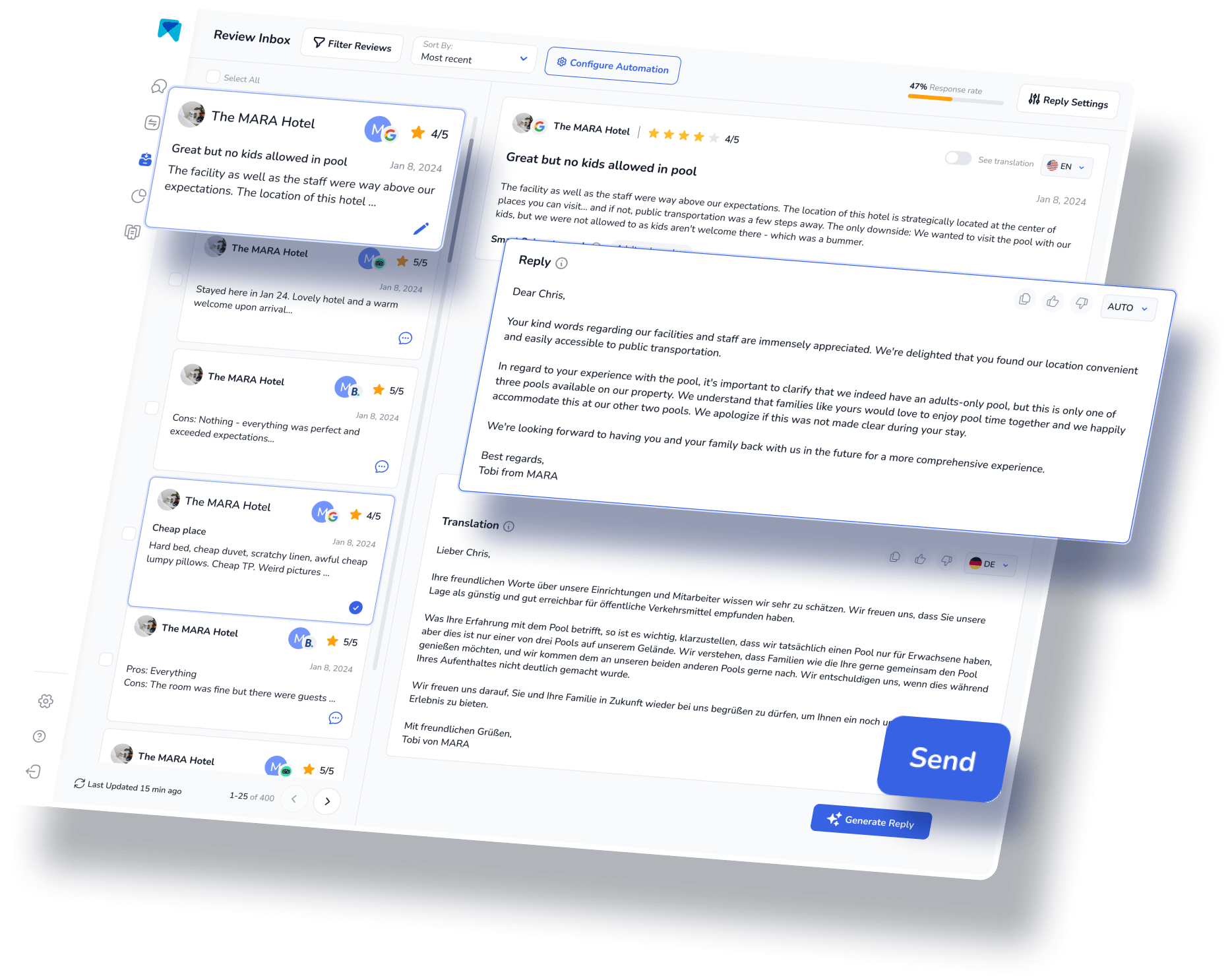
Smart-Review Analytics
To help you understand and analyze the multitude of reviews, the Review Assistant also incorporates Review Analytics. This provides actionable, easy-to-understand insights that are tailored exclusively to your business. With MARA, you can quickly get the gist of all your reviews without needing to read each one. The analysis is so detailed that you can find out about specific issues like"disturbing room service", "lighting in hotel rooms", "water in the pool is too cold" or "lack of vegan breakfast option”. These insights help optimize guest experience without requiring you to be a data expert.
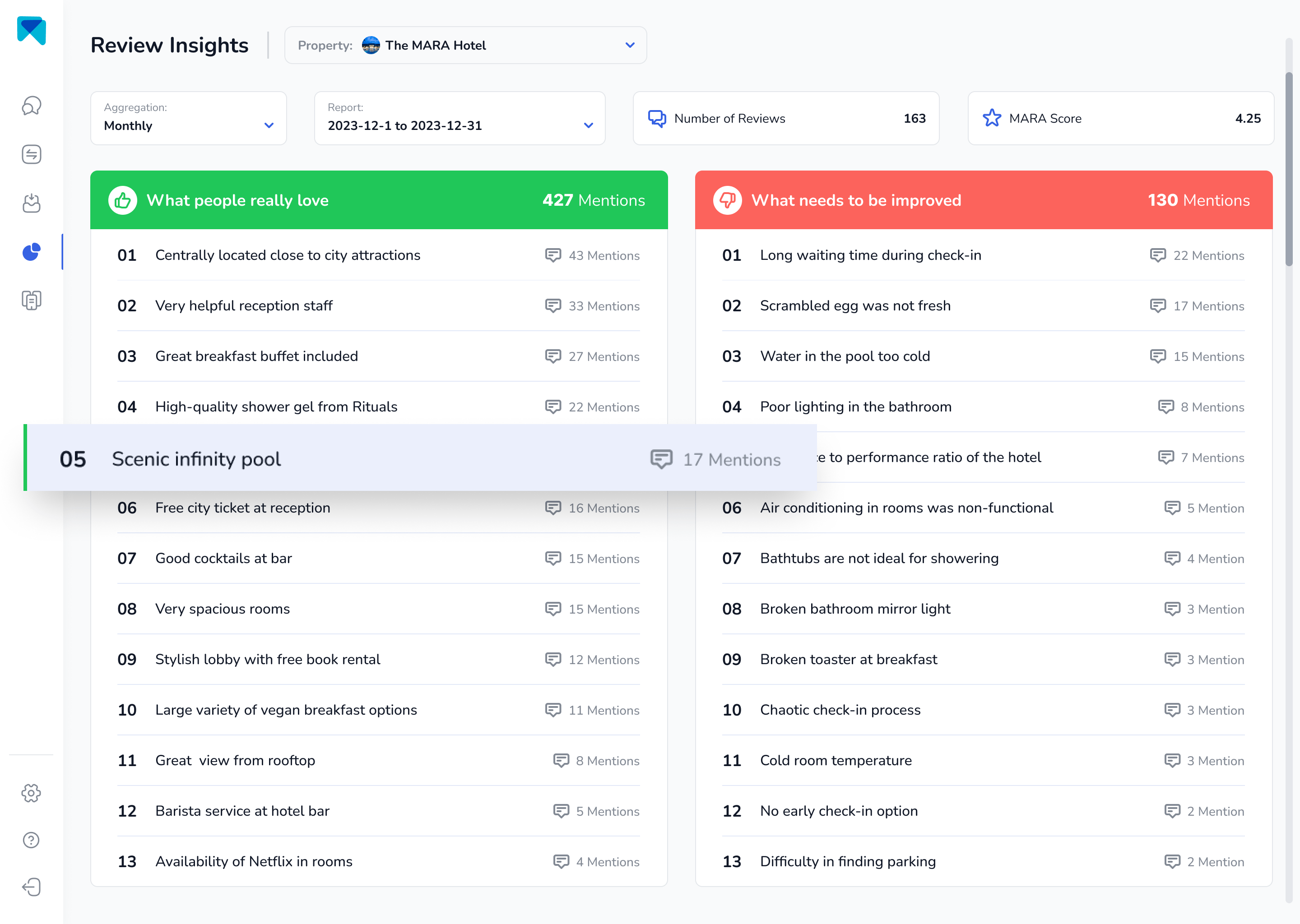
Simplified Review Automation
After gaining trust in your personal AI Review Assistant, you can even go on autopilot and create automation rules. This way, you can specify which reviews should be replied to by the AI directly with no additional approval. With the configuration below, all Google reviews with no text and a star rating of 4 and above are answered automatically.

AI-Powered Personalization
MARA's AI isn't just about efficiency; it's about personalization too. The Brand Voice feature allows the AI to adapt to your tone, making sure your responses sound authentically you. Plus, with Smart Snippets, you can "teach" the AI how to respond to recurring praises or complaints. Your AI then incorporates this information into its responses, but always with different words, providing more personalized, relevant replies.
This review response assistant has quickly become a game-changer for over 2000 customers. Its promising capacity to elevate your overall rating, amplify response rates, glean insights from customer feedback, and economize both time and money, is the reason behind its growing popularity.
Final Thought
Technology trends in the hotel industry such as cloud-based Property Management Systems (PMS), AI-driven automation, IoT integration, voice-activated solutions, and enhanced guest communication are transforming the industry by streamlining operations, enhancing guest experiences, and maintaining competitiveness. Embracing these trends is crucial for future-proofing businesses, fostering guest loyalty, and delivering exceptional service in a fast-paced, digital landscape. You can start by deploying simple but significantly useful software like MARA, which streamlines the process, personalizes responses, and provides valuable insights. Test MARA for free—no credit card is needed and fully operational in less than five minutes.
This post is part of our hero content series on ”The Future of Hotel Technology: Must-Have Tools and Solutions for Modern Hotels”.
Frequently Asked Questions:
In the hospitality industry, current trends include personalized guest experiences through data analytics, the adoption of contactless technologies like mobile check-ins, and enhanced guest communication via AI-driven customer service tools.
An essential technology tool for today's hospitality businesses is a robust Property Management System (PMS), which streamlines operations such as reservations, check-ins, and room assignments, crucial for managing daily tasks efficiently.
Smart technology in hospitality integrates IoT devices to enhance guest experiences. Examples include smart hotel roomswith IoT-enabled controls for lighting, temperature, and entertainment, providing guests with personalized and convenient stays.
Technology integration in hospitality refers to the seamless incorporation of digital tools like cloud-based PMS, AI-driven customer service, and mobile apps into hotel operations. This integration enhances efficiency, guest satisfaction, and overall service delivery.
Applied business tools in hospitality management encompass a range of technologies including CRM platforms for guest relationship management, ORM tools for online reputation management, and analytics solutions for data-driven decision-making. These tools optimize operational processes and elevate guest experiences.



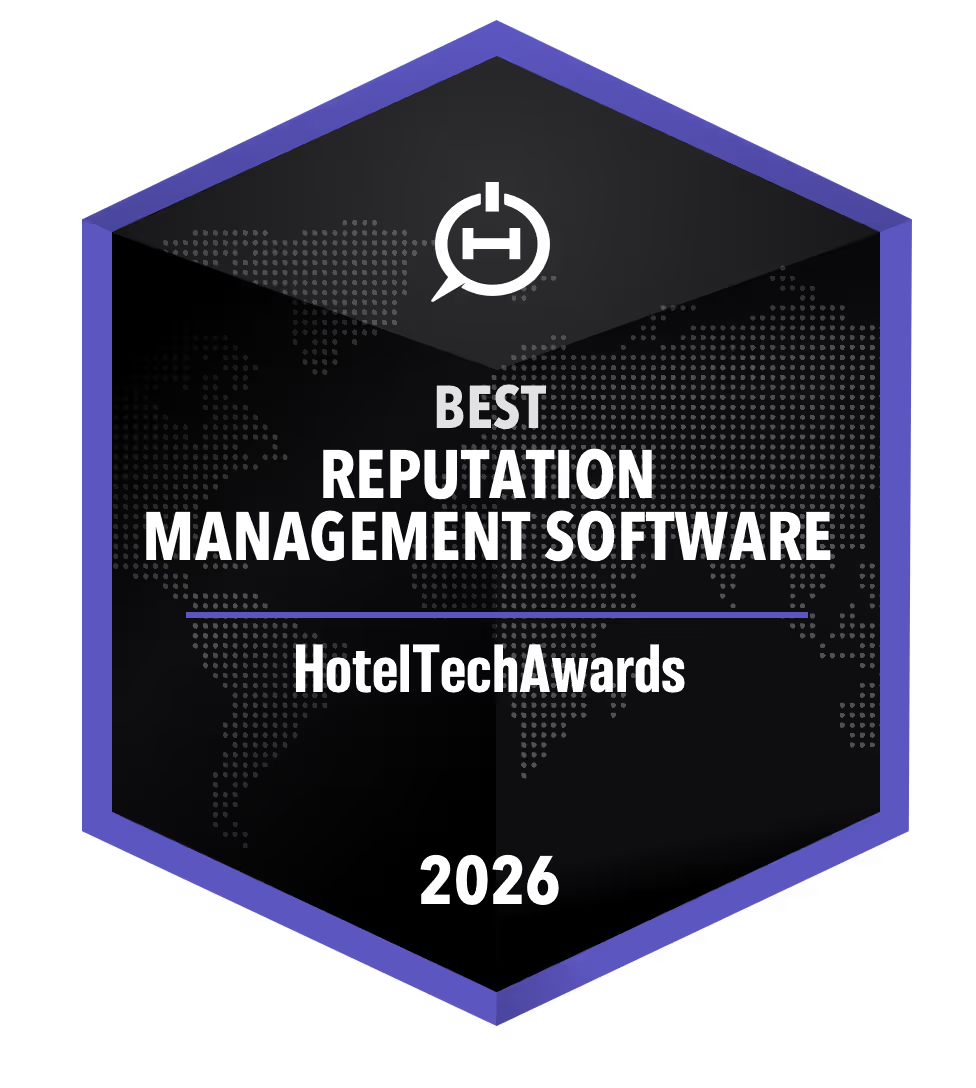

















%20(1)-min.png)
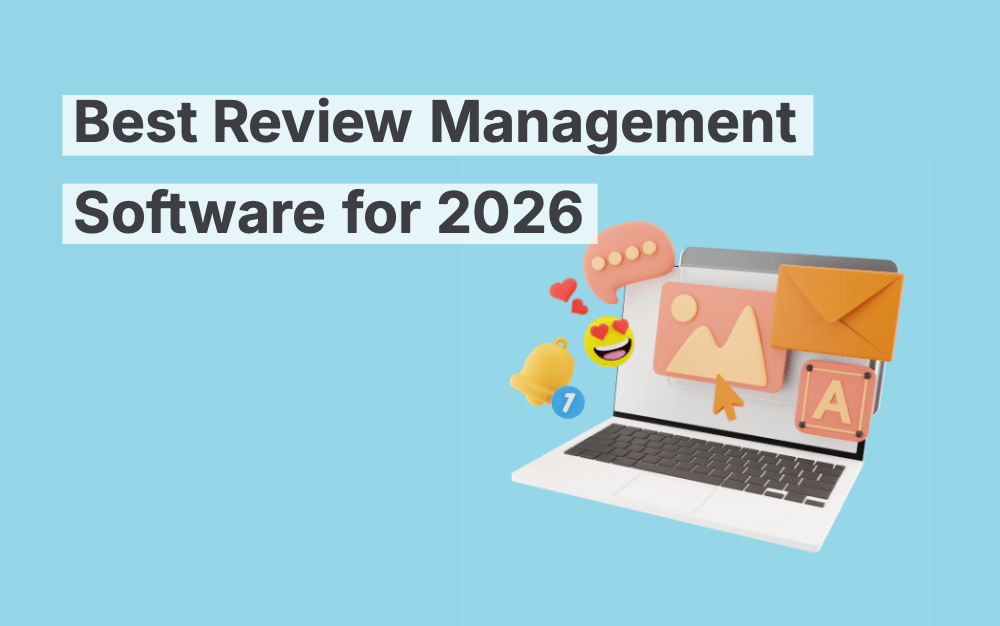
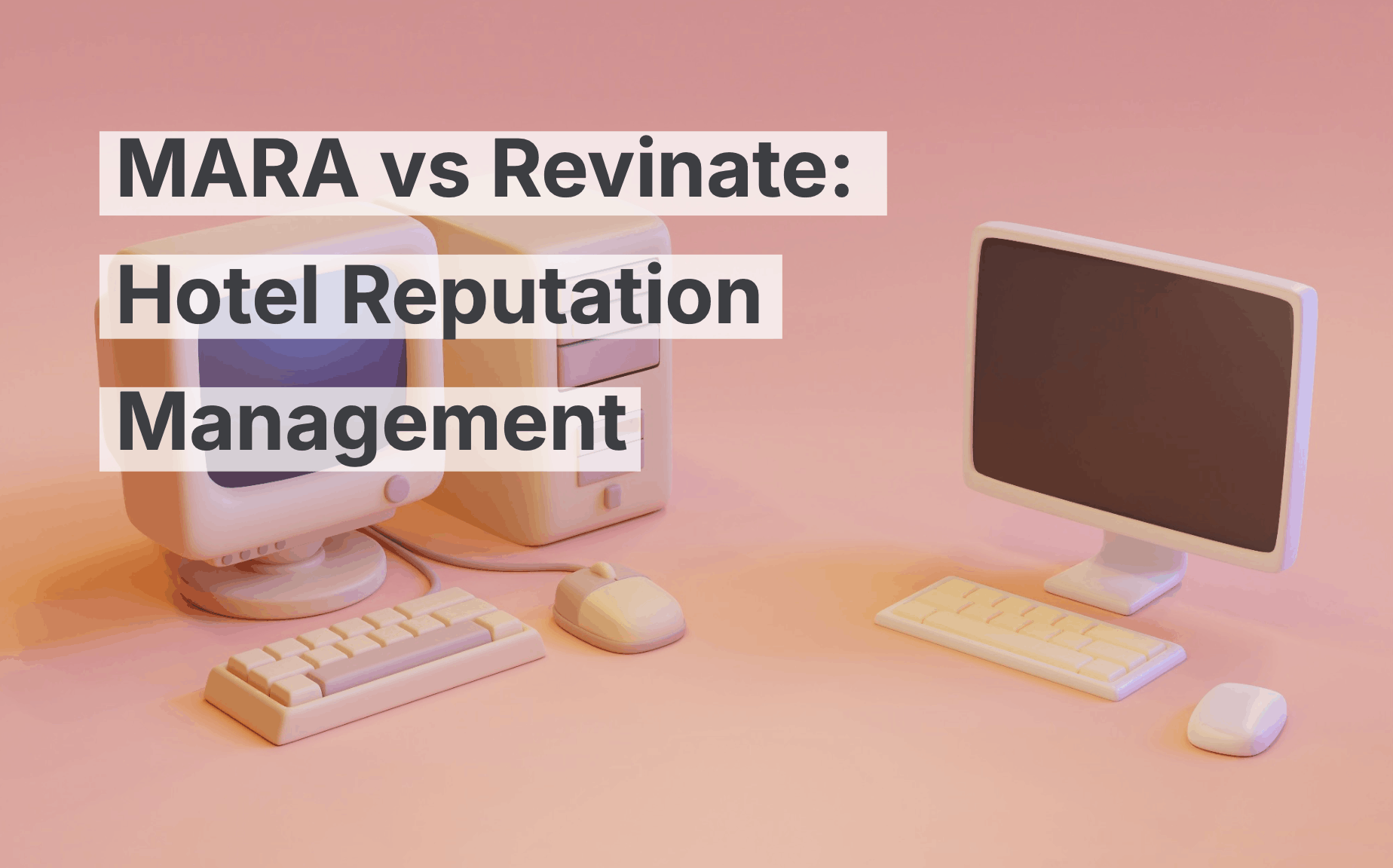
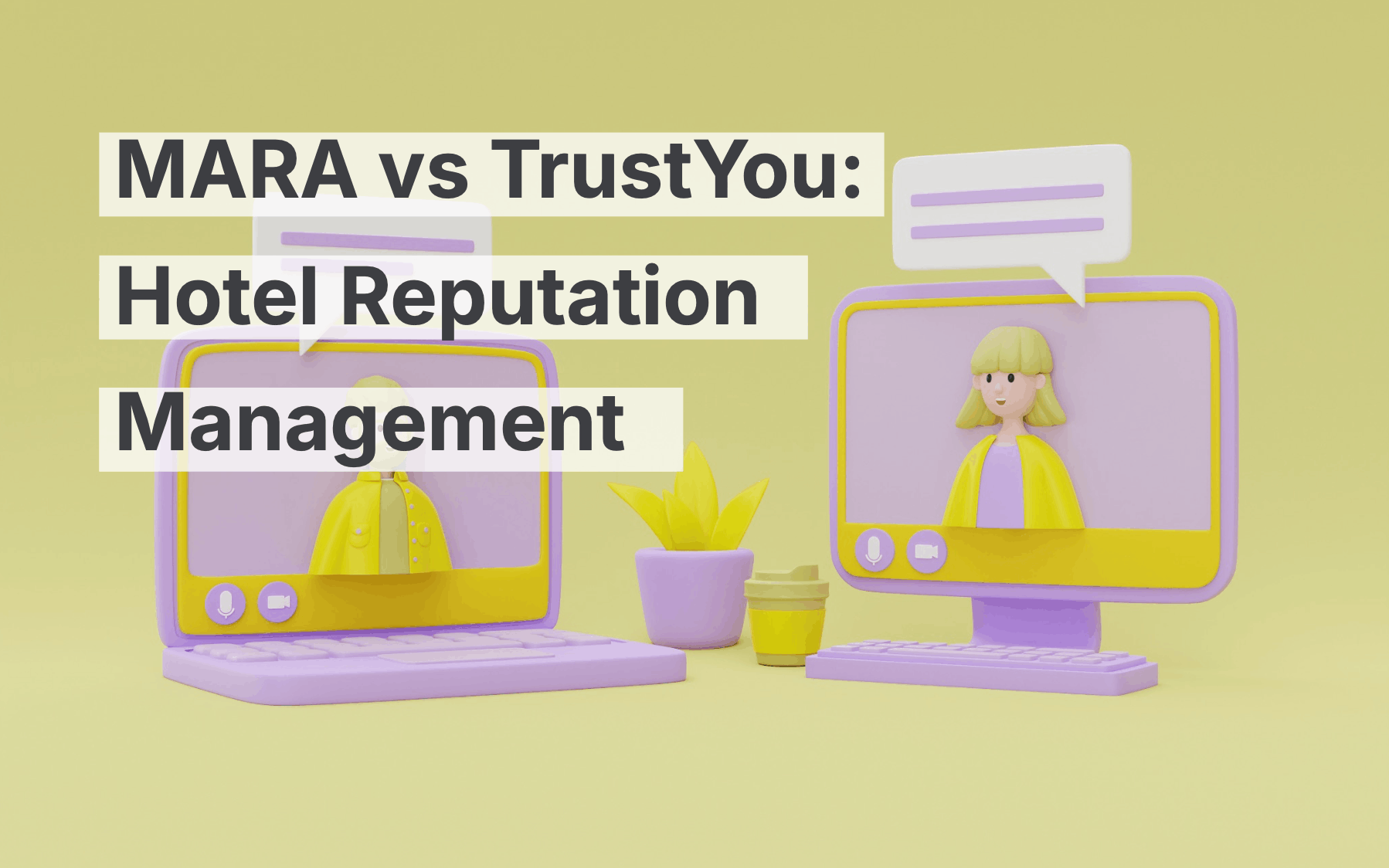





-min.avif)
